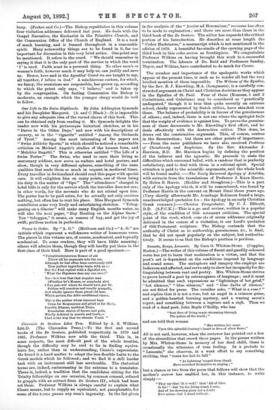The number and importance of the apologetic works which appear
at the present time, is such as to render all but the very briefest mention of them impossible. The Witness of the Epistles, by the Rev. R. J. Knowling, M.A. (Longmans), is a carefully con- structed argument on Christ and Christian doctrine as they appear in the Epistles of St. Paul. Four of these (Romans, 1 and 2 Corinthians, and Galatians) may be considered as "practically undisputed," though it is true that quite recently an extreme school, chiefly represented by Dutch critics, have attacked even these. The balance of probability is in favour of the genuineness of others ; and, indeed, there is not one where the apologist feels that the weight of evidence is against him. To prove the genuine- ness of these documents is Mr. Knowling's first effort, and he deals effectively with the destructive critics. This done, he draws out the constructive argument. This, of course, centres in the Resurrection ; but there are other points of importance. —From the same publishers we have also received Problems of Christianity and Scepticism. By the Rev. Alexander J. Harrison, B.D. Mr. Harrison begins by defining the position of the believer and the agnostic. He proceeds to state the difficulties which surround belief, with a candour that is perfectly satisfactory, and to deal with them in a rational spirit. Special attention is paid to the scientific arguments, and the whole book will be found useful. —The Newly Recovered Apology of Aristides, with extracts from the translations of Professor J. Knox Harris. By Helen B. Harris. (Hodder and Stoughton.)—This is a part only of the Apology which, it will be remembered, was found by Professor Harris in the convent on Mount Sinai three years ago. (Very shortly afterwards Mr. Armitage Robinson found a large, unacknowledged quotation fro a the Apology in an early Christian Greek romance.)—Christus Comprobator. By C. J. Ellicott, D.D. (S.P.C.K.)—This is a gel eral review, written in a popular style, of the condition of Old- estament criticism. The special point of the work, which cons ate of seven addresses originally delivered in the course of a visitation, is our Lord's quotation of Old-Testament scripture. The Bishop contends that the authority of Christ as to authorship, genuineness, &b., is final, that he did not speak popularly on the subjeet, but authorita- tively. It seems to us that the Bishop's position is perilous.


































 Previous page
Previous page